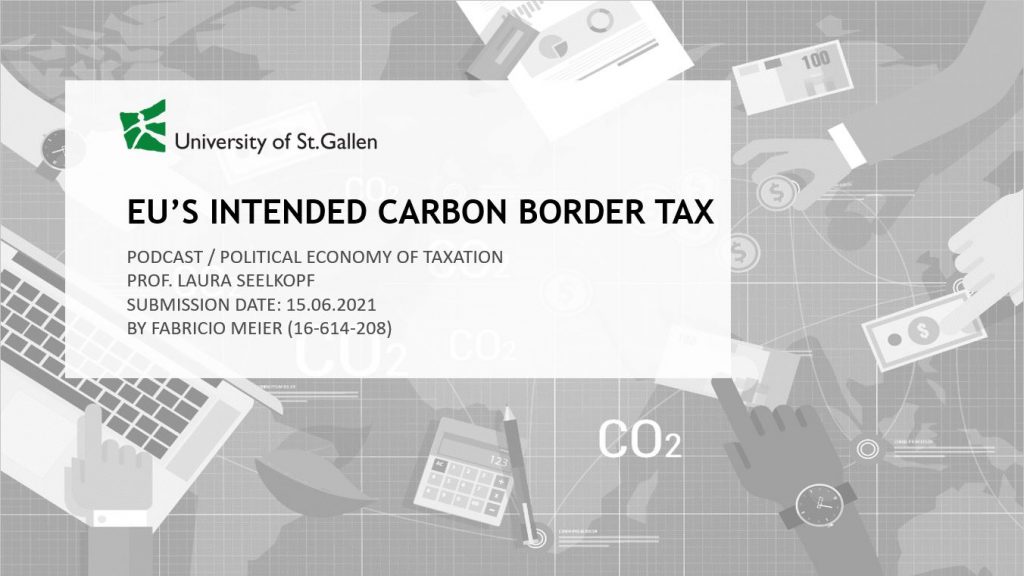
Abstract
The first episode of the Political Economy of Taxation Podcast deals with the EU’s intended Carbon Border Tax. A more detailed legal proposal is expected towards the end of the month. Thus, the aim is to give informative insights about the intended Carbon Border Tax to raise awareness just before the EU publicizes the proposal. The Carbon Border Tax intends to impose the same cost on imports that do not face carbon taxes outside the EU. This approach aims at reflecting more accurately the price of imports and with its carbon content. Ultimately, carbon leakage should be prevented. In terms of the design, it is expected that the Carbon Border Tax will be imposed in specific carbon-intensive sectors with a high risk of carbon leakages, such as the coke and refined petroleum sectors. These sectors will most likely also be the losers of such a tax. On the other hand, states and companies that can adapt quickly by reducing their carbon footprints regardless of being inside or outside the EU would be benefitting from the introduction of a Carbon Border Tax. It is hard to evaluate the effectiveness of Carbon Border Taxes since there is a lack of data. The EU’s intended Carbon Border Tax also includes various political aspects, such as new revenue sources, the division among EU-Members and the idea of a climate club. Switzerland most likely will be exempted from such a Carbon Border Tax since it has similar carbon prices in place, and the EU stressed to comply with WTO rules.
Sources
Bierbrauer, Felix; Felbermayr, Gabriel; Ockenfels, Axel; Schmidt, Klaus M.; Südekum, Jens (2021). A CO2-border adjustment mechanism as a building block of a climate club, Kiel Policy Brief, No. 151, Kiel Institute for the World Economy (IfW), Kiel
Bloomberg (2021). The World’s first Carbon Border Tariff, Explained. Retrieved from https://www.bloomberg.com/news/articles/2021-04-09/how-to-understand-the-eu-s-carbon-import-levy
Branger, F., & Quirion, P. (2014). Would border carbon adjustments prevent carbon leakage and heavy industry competitiveness losses? Insights from a meta-analysis of recent economic studies. Ecological Economics, 99, 29-39. doi: 10.1016/j.ecolecon.2013.12.010
Dechezleprêtre, A., & Sato, M. (2017). The Impacts of Environmental Regulations on Competitiveness. Review Of Environmental Economics And Policy, 11(2), 183-206. doi: 10.1093/reep/rex013
European Commission (2019). A European Green Deal. Retrieved from https://ec.europa.eu/info/strategy/priorities-2019-2024/european-green-deal_en
European Commission (2020). EU Green Deal (carbon border adjustment mechanism) Inception Impact assessment. Retrieved from https://ec.europa.eu/info/law/better-regulation/have-your-say/initiatives/12228-Carbon- Border-Adjustment-Mechanism
Hamilton, T. (2021). The EU wants a carbon border tax on imports – but would it do the job officials expect? Retrieved from https://theconversation.com/the-eu-wants-a-carbon-border-tax-on- imports-but-would-it-do-the-job-officials-expect 157118#:~:text=What%20is%20a%20carbon%20border,companies%20to%20reduce%20their%20emissions.
Ismer, Roland, Karsten Neuhoff and Alice Pirlot (2020). Border Carbon Adjustments and Alternative Measures for the EU-ETS: An Evaluation. DIW Discussion Paper 1855.
Lamy, Pascal, Geneviève Pons and Pierre Leturq (2020). Greening EU Trade: A European Border Carbon Adjustment Proposal. Europe Jacques Delors Policy Paper, June. https://institutdelors.eu/wp-content/ uploads/2020/06/PP_200603_Greeningtrade3_Lamy-Pons-Leturcq_EN.pdf.
Politico (2021). Europe’s plan to tax the world into climate ambition. Retrieved from https://www.politico.eu/article/europes-plan-to-tax-the-world-into-climate-ambition-joe-biden-frans-timmermans/
RonaldKah (2021). Podcast Musik. Retrieved from https://ronaldkah.de/podcast-musik-kostenlos/
Reuters (2021). EU sees carbon border levy as “matter of survival” for industry. Retrieved from https://www.reuters.com/article/us-climate-change-eu-carbon-idUSKBN29N1R1
Simon, F. (2021). Timmermans: Fossile Brennstoffe wie Erdgas haben “keine Zukunft”. Retrieved from https://www.euractiv.de/section/energie-und-umwelt/news/timmermans-fossile-brennstoffe-wie-erdgas-haben-keine-zukunft/
Zachmann, G. and McWilliams, B. (2020). ‘A European carbon border tax: much pain, little gain’, Policy Contribution 05/2020, Bruegel
Zhang, Z. (2018). Trade and Climate Change: Focus on Carbon Leakage, Border Carbon Adjustments and WTO Consistency. Foundations And Trends In Microeconomics, 12(1), 1-108. doi:10.1561/0700000060
Recent Comments